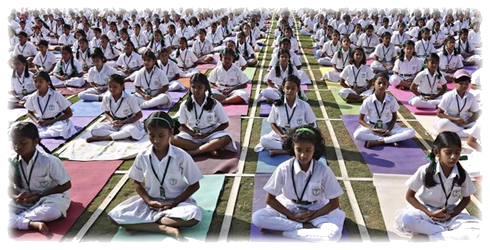Curative Yoga
Most people, specially from western worlds, think of yoga as merely an eastern exercise program. Nothing could be further from the truth.
Union with this unchanging reality liberates the spirit from all sense of separation, freeing it from the illusions of time, space and causation. Since according to yogic philosophy the human body and mind are part of the illusory world of matter, with a limited time span, while the soul /spirit is eternal and passes onto another world when this body wears out. Thus, central to yogic philosophy are the concepts of Karma (cause- effect relationships) and Reincarnation.
Yoga is therefore regarded as a divine science of life, revealed to enlightened sages in meditation. First textual mention in the Vedas was corroborated by oldest archaeological evidence of seals from the Indus Valley dating back to around 30000 B.C.

The Upanishads that followed the Vedas provide the main foundation of Vedanta philosophy (that espouses the idea of an absolute consciousness called Brahma) and yoga teachings.
The backbone of Raja Yoga is furnished by Patanjali's Yoga Sutra, thought to have been written in the third century B.C. The classical text onHatha Yoga, the Hatha Yoga Pradipika which describes the various asanas and breathing exercises which form the basis of the practice of modern yoga, was compiled much later by a yogi named Svatmarama.
In the modern perspective, Yoga is one of the most effective and wholesome forms of experience to control the waves of thought by converting mental & physical energy into spiritual energy. Yoga eases away pent-up tension, rejuvenates the body & soul, enhances concentration, cures diseases and keeps a hold on the aging process.
Benefits of Yoga
Preventive Value
- Yoga helps to bring natural order and balance to the neuro-hormones and metabolism in the body.
- At the same time, these exercises improve endocrine metabolism, thus providing you with a preventive shield.
Curative Value
- Yogic postures activate the energies that have accumulated and stagnated in the energy pockets of the body - since left inert, these energies create various ailments.
- Yogic exercises cleanse your body, mind and consciousness by venting toxins from the body.
Principles of Yoga
Patanjali's Eight Principles of Yoga
- Abstinence (yama)
- Observance (niyama)
- Posture (asana)
- Regulation of breath (pranayama)
- Withdrawal of Senses (pratyahara)
- Concentration (dharana)
- Meditation (dhyana)
- Super Consciousness (samadhi)
BSSRO “ Giyani JI” Modified Five Principles of Yoga
1. Proper relaxation
- Releases tension in the muscles
- Helps letting go of all worries
- Ensures conservation of energy
2. Proper exercise
- Yoga postures - to be performed as per body constitution.
- Yogic consultation is a must.
- Correct postures work systematically on all parts of the body. Stretching and toning the muscles & ligaments. Keeping the spine and joints flexible. Improving the blood circulation.
3. Proper breathing (pranayama)
- Brings an extraordinary balance in the consciousness
- Teaches you to control your mental state by regulating the flow of the life force.
4. Proper diet
- Chart out a well-nourished balanced diet.
- Keeps the body light and supple and the mind calm.
- Resists ailments.
5. Positive Thinking & Meditation
- Removes negative thoughts. Stills the mind.
- You attain super-consciousness. A state beyond time, space and causation.